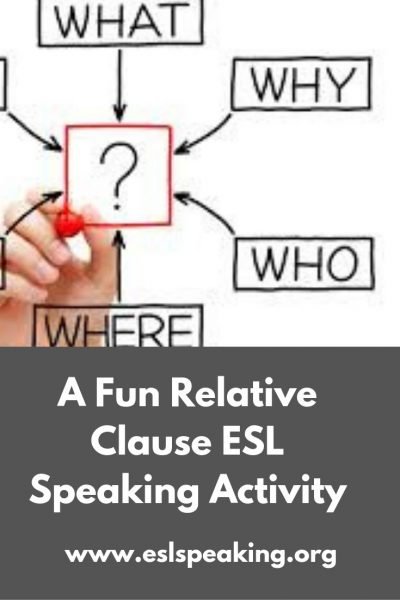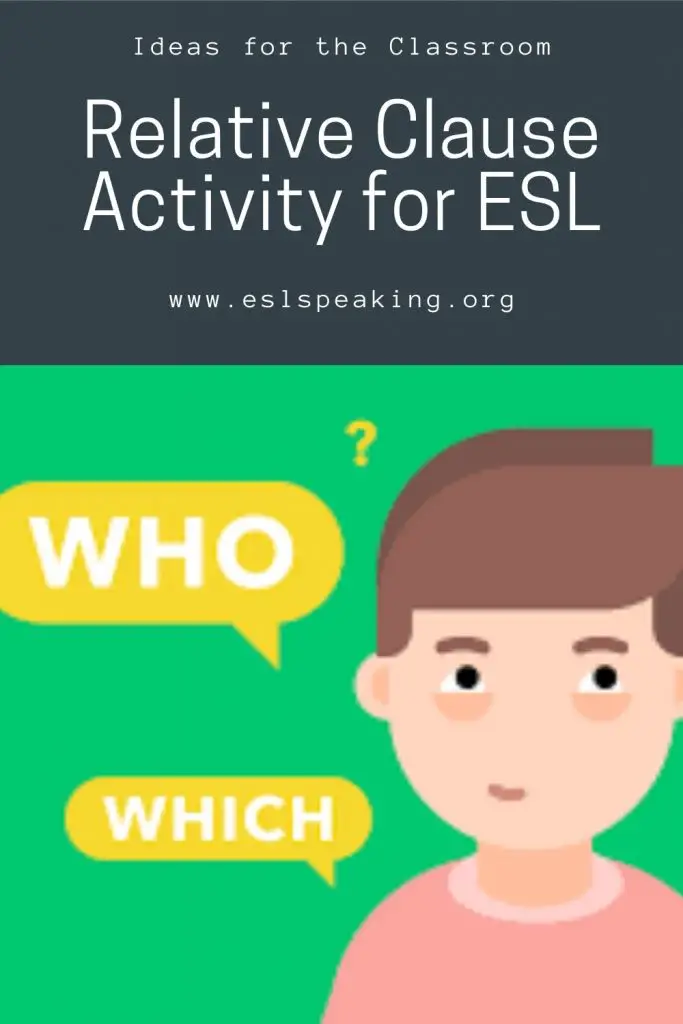Relative clauses are a classic grammar point that you’ll find in just about every 4-skills ESL textbook. The grammar is simple enough, but it can be a bit difficult to come up with a fun relative clause activity or game that gets students to use relative clauses when speaking. That’s where a good relative pronouns game can come in.
Help is here with this fun and engaging relative clause activity to try out with your students. It’s one of the best relative pronoun ideas for ESL. Check out this relative clauses game for all levels and ages.

Relative clause activity
Here’s a fun activity to get your students to speak and use relative classes so that you can get beyond the pen and paper. Check out one of the best relative clause games for ESL/EFL students, and let me know how it goes by leaving a comment below.
Relative Clause Speaking Activity
If you’re teaching about relative clauses (who, which, that), and want to lighten up the mood a bit you can use this “Who or What is it?” relative clause speaking activity. My students always love it and they have a really fun time playing it together. Of course, relative clauses are important for describing people or things in English so some focused attention on them is certainly a good thing.
Relative clauses are a bit grammar-heavy to teach and lessons about them are usually focused on pen and paper exercises. But, it is possible to practice relative clauses in a fun speaking activity too.
Here’s How to Set Up this Relative Clause Activity
Level: High Beginner to Intermediate
Time Required: 10-15 minutes
Materials: List of people or things (one per group of 3-5 people)
Make a list of things or people, cut them up into little pieces and put them in an envelope (here’s my very Korea-centric who/what list).
Put the students in groups of 4 and the first person has to choose a paper at random and keep it secret. Then, they give hints about the paper to the rest of their group, preferably using relative clauses or reduced relative clauses.
The other people in the group get to guess who it is and whoever guesses it correctly gets to keep the paper. They get 1 point and then is the next person chooses a random paper and gives hints. This helps to prevent one student from running away with a certain victory.
The winner is the person with the most points at the end of the allotted time. It’s usually quite a tight race because the winner of each round has to be the next person to give hints, so can’t get a point. I usually bring a small prize for the winner from each group to create some excitement about it.
An Example for this Relative Clauses Game
For example, if the students chose Barrack Obama from the envelope of papers, they could say things like:
“This is a man who’s from the USA.”
“I’m sure he’s someone everyone knows.”
“He has a lot of power which he uses to influence the whole world.”

Relative Clause ESL Activity
How to Avoid Endless, Incorrect Guesses with this Relative Clauses ESL Game
In order to avoid endless incorrect guesses, I make a rule that if you make an incorrect guess, you are “out” of that round unless all the other people also have incorrect guesses, in which case it starts over.
I point out to students that they should start with very general hints at the beginning and then get into more specific ones at the end in order to make it a bit more fun and last longer.
During and After the Activity
While the relative clause game is going on, the teacher can circulate around the room and ensure that students are using relative clauses correctly (or using them at all!). Give encouragement and feedback about this.
After the activity, you can give some feedback to the whole class about their use of the correct grammar. I don’t point out individual mistakes but will give general feedback to everyone about things that I heard more than once.

Relative clauses game
More Relative Clause ESL Ideas
- Amazon Kindle Edition
- Bolen, Jackie (Author)
- English (Publication Language)
- 187 Pages - 03/09/2016 (Publication Date)
Did you like this relative clause game? Then you’re going to love this book on Amazon: 101 ESL Activities for Adults. The key to better TEFL classes is a wide variety of interesting, engaging and interactive games and activities. This book will help you get there in style.
You can find the book in digital, print and audio formats. Take some serious lesson planning inspiration with you on the road, or keep a copy on the bookshelf in your office. Whatever the case, get ready for some ESL teaching awesome with this book.
Check it out for yourself:
Relative Pronouns Games FAQs
There are a number of common questions that people have about teaching relative pronouns using games. Here are the answers to some of the most popular ones.
What are relative clauses in English?
Relative clauses are parts of sentences that provide additional information about a noun. They usually start with relative pronouns like “who,” “which,” “that,” “whose,” or “whom.”
Why are relative clauses important to learn in ESL?
Relative clauses help learners create more complex sentences and provide extra details, enhancing their communication skills.
What’s a fun game to practice relative clauses in ESL?
“Relative Clause Charades” – Students act out a sentence containing a relative clause without saying the noun being described. Others guess the missing noun.
How can I make a grammar auction game for relative clauses?
Provide sentences missing relative clauses on slips of paper. Students bid on sentences and add the correct relative clause. The most accurate bids win.
What’s a simple group activity for practicing relative clauses?
“Relative Clause Story” – Each student adds a sentence with a relative clause to build a story. This encourages creativity and proper usage.
Can you suggest a game for differentiating between restrictive and non-restrictive clauses?
“Restrictive vs. Non-Restrictive Race” – Write sentences on the board with mixed clauses. Students categorize them correctly into “restrictive” or “non-restrictive” groups.
What’s a partner game for relative pronoun practice?
“Relative Pronoun Match” – Students match sentence halves that contain relative clauses, focusing on the correct relative pronouns.
How can storytelling enhance relative clause learning?
“Relative Clause Chain Story” – Students take turns adding sentences to a story, each with a relative clause that builds on the previous sentence.
What’s an outdoor game that incorporates relative clauses?
“Relative Clause Scavenger Hunt” – Hide items around the area and give students clues with sentences containing relative clauses to find them.
Have your say about this Relative Clause Activity
What is your favourite relative clause game or activity that you do with your ESL students? Leave a comment below and let us know what you think. We’d love to hear from you.
Also be sure to give this article a share on Facebook, Pinterest, or Twitter. It’ll help other busy teachers, like yourself find this useful resource for teaching grammar.
Last update on 2025-04-09 / Affiliate links / Images from Amazon Product Advertising API







Mine is Time’s Up; the students write a name, a place, an object, an animal, etc on a card. They split in 2 teams=A & B
One student from team A, picks a card and starts a description with unlimited words, always ending with a wh Question: what who where when etc. To be guessed by the other students from team A.
If good guess, the student picks another card and does the same thing, until the time is up! (you define yourself the timing related to the level of the students)
Team B does the same job.
The winning team is the one with the highest number of guessed cards.
You can add 2 more rounds.
2nd round with only one word of description allowed.
3rd round, by miming or drawing the card.
Fun guaranteed
Ahh…relative clauses! It’s a serious struggle to come up with fun, interesting things to do with my students for this but your activity seems really awesome and I plan to give it a go. Thank you.
I also find it pretty difficult to come up with new and interesting ideas for relative clause activities. Thanks for all the great ideas here.
What a great game. Very useful. Just what I was looking for. Many thanks!
Love the relative clause games for ESL/TEFL students! The activities are interactive and fun, and I can already see my students enjoying them in class. The use of visual aids and real-life examples makes it easier for them to understand the concepts. Great post, thank you!